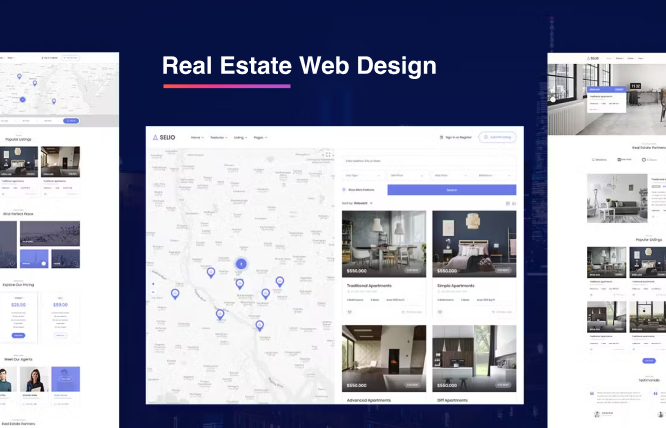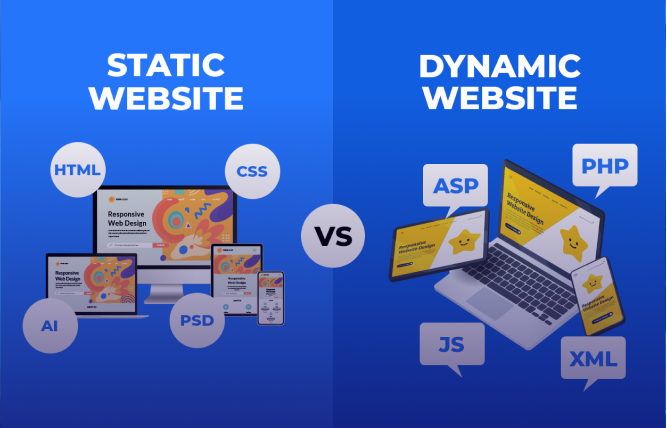Introduction
The real estate industry is booming thanks, to the rise in digital transformation. With reliable real estate web design and leveraging current technological trends, your real estate business can reach a wider audience. Read on to learn the core features and the current trends in the real estate industry.
The real estate industry is growing rapidly with a market value of $634.9 trillion in 2024 to an expected $727.8 trillion by 2029. The reason for this exponential growth is the rise of the digital era. According to the National Association of Realtors, 52% of buyers found their residential property through the internet. This shows that having an online presence is a major factor in the growth of the industry.
The rise of the internet coupled with several other trends that are shaping the way global industry’s function is all playing a part in how organisations are conducting their business processes. In this article, we will discuss the key features necessary for a real estate website, and trends that will dictate the future of the industry.
Key Features of Real Estate Web Design
Before we discuss the key feature of a real estate website, we first need to understand the different types of real estate websites in the market. While most people believe that a real estate website is one that only deals with property listings, but that is far from the truth.
Following are the four main types of real estate websites:
- Property listing websites: These websites bring together tenants and landlords in one place and help people find their next potential house.
- Real estate marketplaces: These are seen as a digital intermediary between property owners and buyers, often used to perform transactions, which can be an excellent monetisation source for their owners.
- Real estate aggregators: A centralised hub which allows potential buyers to look at an extensive catalogue of current offers with the ability to filter and sort them by various parameters.
- Property management websites: This type of a real estate website is dedicated to landlords, allowing them to manage their property’s occupancy and track and process utility bills.
Property listing sites are the most popular out of all these websites and there are number of core features that are necessary in every real estate website that is built via custom web design and development.
Clear Navigation
Clear navigation is essential for any real estate website to provide a seamless user experience. It ensures that visitors can easily find the information they are looking for, such as property listings, agent contacts, and service details. Well-organised menus and intuitive layout reduce the bounce rate and keep users engaged, which is critical for converting visitors into clients. Clear navigation also improves search engine optimisation (SEO), making it easier for potential clients to find the website through search engines.
Device Compatibility
Device compatibility, or responsive design, ensures that a real estate website functions well on various devices, including desktops, tablets, and smartphones. As a significant number of users browse the internet on mobile devices, having a mobile-friendly website is crucial. It not only improves user experience but also enhances SEO rankings since search engines prioritise mobile-optimised sites. Device compatibility helps in retaining potential clients who might otherwise leave if the site is difficult to navigate on their device.
Security
Security is paramount for real estate websites, especially since they often handle sensitive client information such as contact details and financial data. Implementing HTTPS and other security measures protects against data breaches and builds trust with clients. A secure website reassures visitors that their personal information is safe, which can significantly impact their willingness to use the website services. Security features also protect the website from cyber threats, ensuring uninterrupted functionality and availability.
MLS (Multiple Listing Service) Integration
MLS integration allows real estate websites to display up-to-date property listings directly from the Multiple Listing Service database. This feature provides visitors the most current information on available properties, which is crucial for buyers and sellers. MLS integration enhances the credibility of the website, as it shows comprehensive and accurate listings. It also saves time for real estate agents by automating the listing updates, ensuring that the website always has the latest data.
Search Capabilities
Advanced search capabilities enable users to filter properties based on various criteria such as location, price range, property type, and amenities. This feature enhances the user experience by allowing potential buyers to quickly find properties that meet their specific needs. Effective search functionality increases the likelihood of user engagement and satisfaction, leading to higher conversion rates. It also demonstrates professionalism and commitment to helping users find their ideal property.
Set of Images
High-quality images are crucial for real estate websites as they significantly impact a visitor’s first impression of a property. A comprehensive set of images allows potential buyers to visualise the property, making it easier for them to make informed decisions. Well-presented images highlight the property’s features and appeal, which can enhance its attractiveness and value. Including multiple images per listing improves the user experience and increases the chances of converting visitors into leads.
Video or Virtual Excursions
Videos and virtual tours provide an immersive experience for potential buyers, allowing them to explore properties in detail without having to visit them physically. This feature is particularly important in the current digital age, where virtual interactions have become more common. Videos and virtual tours can showcase a property’s layout, features, and ambiance more effectively than static images. They help in building a stronger emotional connection with the property, increasing the likelihood of a sale.
Messaging
Integrated messaging systems facilitate direct communication between potential buyers and real estate agents. This feature allows for quick responses to inquiries, enhancing customer service and engagement. Efficient communication tools help build trust and rapport with clients, which is essential in the real estate industry. Messaging systems also streamline the process of scheduling viewings, discussing property details, and negotiating deals, making the transaction process smoother and more efficient.
Blogs
A blog section on a real estate website serves multiple purposes. It provides valuable content to visitors, such as market trends, buying guides, and home improvement tips, which can attract and retain vistors. Regularly updated blogs improve the website’s SEO by increasing its content volume and keeping it relevant in search engine rankings. Blogs also position the real estate agency as an authority in the industry, helping to build trust and credibility with potential clients. Additionally, engaging blogs can encourage social sharing, driving more traffic to the website.
Future Trends in Real Estate Industry
As technology advances, businesses in the real estate industry are leveraging technology to help them expand their reach and improve revenue.
Following are the benefits of incorporating future trends in your real estate development software and web design:
Interactive 3D Tours
Interactive 3D tours allow potential buyers to explore properties virtually from anywhere in the world. This technology provides a more immersive and detailed view of the property, showcasing its layout and features more effectively than traditional photos or videos. By offering a realistic representation, 3D tours can increase engagement and interest, leading to higher conversion rates. They also save time for both buyers and agents by allowing preliminary tours online, reducing the need for in-person visits until a buyer is interested.
Mobile-First Design
With majority of users accessing websites via mobile devices, a mobile-first design approach ensures that real estate websites are optimised for smaller screens. This trend focuses on creating user-friendly interfaces that load quickly and function smoothly on smartphones and tablets. Mobile-first design improves user experience, making it easier for potential buyers to browse listings and contact agents on-the-go. It also boosts SEO rankings, as search engines favour mobile-optimised sites, leading to increased visibility and traffic.
AI-Powered Chatbots
AI-powered chatbots provide immediate, 24/7 customer support by answering queries, scheduling appointments, and providing property information. These chatbots can handle a large volume of inquiries simultaneously, improving efficiency and response times. They can also collect and analyse data on user interactions, helping agents understand client preferences and needs better. By enhancing customer service and streamlining communication, AI chatbots can increase client satisfaction and engagement.
Minimalist Aesthetics
Minimalist aesthetics mean clean, simple design with ample negative space, easy-to-read fonts, and a limited colour palette. This design trend creates a modern, professional look that enhances user experience by making navigation intuitive and content easily accessible. Minimalist websites, made by reliable WordPress web development services, load faster and reduce distractions, allowing potential buyers to focus on key information and property listings. This approach also improves SEO and increase the site’s overall appeal and usability.
Voice Search Optimisation
Search engine optimisation services for voice search ensures that real estate websites are ready to accommodate the increasing use of voice-activated assistants like Siri, Alexa, and Google Assistant. Optimising content for voice search involves using natural language and long-tail keywords that people are likely to speak. This trend can benefit the industry by capturing a growing segment of users who prefer voice search, improving accessibility, and potentially increasing traffic from voice search queries.
AI & Machine Learning Integration
AI and machine learning integration can revolutionise the real estate industry by providing advanced data analysis and predictive insights. These technologies can analyse market trends, property values, and buyer preferences to offer personalised recommendations and more accurate pricing. They can also automate tasks such as property matching and lead scoring, enhancing efficiency and effectiveness. By leveraging AI and machine learning, real estate professionals can make more informed decisions and provide better service to their clients.
Sustainable & Eco-Friendly Web Design
Sustainable and eco-friendly web design focuses on reducing a website’s environmental impact by optimising energy consumption and using green hosting services. This trend aligns with the growing consumer demand for environmentally responsible practices. By adopting sustainable design principles, real estate websites can appeal to eco-conscious clients and enhance their corporate social responsibility image. Additionally, optimised websites tend to load faster and perform better, improving user experience and SEO rankings.
Augmented Reality (AR) Features
Augmented Reality (AR) features allow potential buyers to visualise properties and interior designs by overlaying digital information on the real-world view. For instance, AR can enable users to see how furniture fits in a room or explore the property layout in 3D. This interactive experience can enhance engagement and help buyers make more informed decisions. AR can also be used in marketing materials to create memorable and immersive presentations, giving real estate firms a competitive edge.
Conclusion
Taking the help of new technologies and ensuring that the core features are present within your organisation can help you boost your real estate business and reach a wider audience. Core features ensure that your potential customer gets all the information and functionality they need when they visit your website. Leveraging existing trends enable businesses to gain a competitive edge and capture the market. Taking these two in parallel can be the perfect recipe for success.
If you aren’t sure as a real estate business what the right method of real estate web design is, you don’t have to worry any more. Let FuturByte’scustom web development services do the job for you. Our team of experts are well versed in creating bespoke real estate web design that are in line with your business requirements. Contact us today for a free consultation.
Frequently Asked Questions
A professional real estate website enhances credibility, showcases property listings effectively, and provides a platform for engaging with potential clients. It serves as a 24/7 marketing tool that can attract more leads, provide valuable information, and facilitate seamless communication between agents and clients.
A mobile-first design ensures that your website is optimised for smartphones and tablets, offering a better user experience for visitors on these devices. With more people accessing the internet via mobile devices, a mobile-first design can increase your site’s accessibility, improve search engine rankings, and drive more traffic.
Interactive 3D tours allow users to virtually explore properties in a detailed and immersive way. They are important because they provide a realistic view of properties, helping potential buyers make informed decisions. This can increase engagement and reduce the need for in-person viewings, saving time for both buyers and agents.
AI-powered chatbots provide instant responses to inquiries, schedule appointments, and offer information about properties. They enhance user experience by providing 24/7 customer service, handling multiple queries simultaneously, and gathering data to help understand client preferences. This improves efficiency and client satisfaction.
Voice search optimisation involves tailoring website content to be easily accessible through voice-activated assistants like Siri and Alexa. It impacts real estate websites by increasing accessibility for users who prefer voice search, improving user experience, and potentially boosting traffic from voice search queries.
Have questions or feedback?
Get in touch with us and we‘l get back to you and help as soon as we can!




